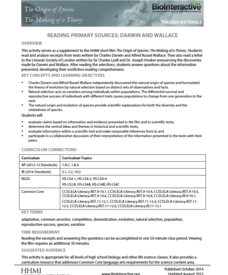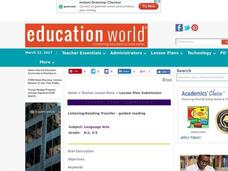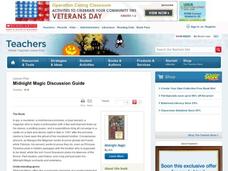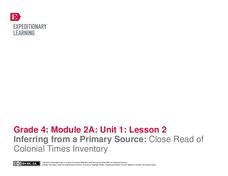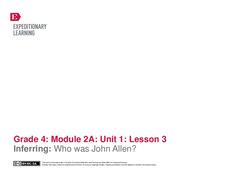Curated OER
Express Yourself Lesson Seed 3
If you're looking to set your class up for writing effective arguments, try out this idea. While originally created with freedom as a guiding idea, the activity could easily be adapted for other themes. As a class, create a chart of...
Curated OER
Express Yourself Lesson Seed 12: Story Event
Focus on plot and the impact-specific events in The Cay. Class members use their double-entry journals, created in a previous lesson in this series, to record their thinking about the guiding question as they read chapters 15 through 17....
National Security Agency
Are You Game? A Lesson Connecting Fractions and Probability
Exactly how fair are the board games children grow up playing? Young mathematicians investigate this questions as they work their way through this five-lesson series on basic probability.
Curated OER
Making Inferences
Students discover how making inferences helps people solve problems. In this inference lesson, students read a story aloud and discuss problems as they occur in the story. Students work in small groups and use events in the text to infer...
Curated OER
Making Inferences about Problem and Solution
Students use unfamiliar objects to make inferences. In this making inferences lesson, students make guesses about what an item does. Students brainstorm together and make lists of ideas and write them on index cards. The teacher gives...
Curated OER
Making Inferences While Identifying Similes and Metaphors
Use this lesson to study similes and metaphors and the inferred meaning. For this language arts lesson, 5th graders write their own similes and metaphors. A worksheet is provided for extension work or to check understanding as homework.
Curated OER
English Lesson Plans for Grade 7
Discuss the correct use of certain phrases such as "managed" and "could" in this English lesson. Middle schoolers listen to interviews on work customs in different countries and compare them. They make inferences after reading given...
Howard Hughes Medical Institute
Reading Primary Sources: Darwin and Wallace
Take your classes back in time. Learners read real historical texts from both Darwin and Wallace as well as an announcement of their findings. Using guiding questions, they make inferences and draw conclusions from the information in the...
EngageNY
Mid-Unit Assessment: Evidence and Inference in Pygmalion
Scholars complete the Pygmalion mid-unit assessment to show their progress toward the unit's stated goals. The assessment requires learners to read text and successfully answer multiple choice and extended response questions.
EngageNY
Establishing Structures for Reading: Gathering Evidence about Salva’s and Nya’s Points of View (Reread Chapters 1 and 2)
Readers practice gathering textual evidence to support their understanding of character point of view in A Long Walk to Water by Linda Sue Park. Working with partners, they complete a Gathering Evidence graphic organizer and engage in...
Curated OER
Build Mastery: Making Inferences
Do your youngsters realize that they are constantly making inferences? Expose this inner process by bringing out the book they will be reading. Ask scholars what they think the plan is, and explain that their answers are the product of...
Curated OER
Listening/Reading Transfer - Guided Reading
Work on predicting and making inferences with Danny and the Dinosaur by Syd Hoff. After every few pages, the teacher asks listeners to make predictions of what will happen next. Develop critical reading strategies with your young learners!
Curated OER
Making Inferences - An Introduction
Help your learners identify the inferences they make every day with this SMART board activity. With a comic strip in the first presentation slide, they make inferences about the situation. A discussion addresses what type of prior...
Curated OER
Express Yourself Lesson Seed 9: Climax
Conduct a close reading of chapter 9 of The Cay. Read the chapter again and ask pupils to respond to a list of included text-dependent questions. Finish the class with the provided writing assignment, which asks learners to use textual...
National Endowment for the Humanities
Poems that Tell a Story: Narrative and Persona in the Poetry of Robert Frost
Dig in deeper with Robert Frost's, "Stopping by Woods on a Snowy Evening." Learners will read and discuss poems by Robert Frost and learn the meaning of terms such as narrative and personal. They journal, collaborate, and present poetry...
Have Fun Teaching
Who Am I? (14)
What's the difference between a clown and a cashier? Use context clues to infer what each character does for a living in five different reading passages. Kids mark their choices on the space provided.
Great Books Foundation
Picture-Books in Winter
Five questions challenge scholars to make inferences after reading a poem, "Picture-Books in Winter" by Robert Louis Stevenson.
Scholastic
Midnight Magic Discussion Guide
This discussion guide accompanies the fiction book Midnight Magic written by Avi, enforces story elements, inferences, and theme/plot. Have the class work on it over time, it will engage even your reluctant readers.
Texas Education Agency (TEA)
Distinguishing Between Inductive and Deductive Reasoning (English III Reading)
Is Sherlock Holmes an inductivist or a deductivist? Users of this interactive to distinguish between inductive and deductive reasoning. They consider in various situations whether it is better to list evidence and then introduce a claim...
K20 LEARN
Here's How I Heard It: Using Folklore To Improve Close Reading Skills
"X" is for exaggeration, and "F" is for fact. To encourage close reading and to improve literary analysis skills, class members annotate fables and tall tales, like Paul Bunyan, with symbols that identify key features of this genre.
DePaul University
Settlement
Early settlers in the American Midwest experienced constant struggle. This reading passage describes for young learners the hardships of homesteaders as they journeyed west and sought to start a new life. When finished, students identify...
EngageNY
Inferring from a Primary Source: Close Read of Colonial Times Inventory
Teach your class about colonial America through an examination of primary documents. First though, start vocabulary notebooks for content-specific and academic vocabulary. Pupils can keep this record during the entire module. Once this...
EngageNY
Reading Literature about Natural Disasters: Inferring about the Impact of Hurricane Katrina on People Living in New Orleans
I survived! Scholars read a firsthand account from a natural disaster survivor in the text Save Bella! They record the gist of the text in their journals and answer text-dependent questions. They then take notes to more deeply analyze...
EngageNY
Inferring: Who was John Allen?
Help your learners work with difficult or archaic words. A continuation of lesson two of this module, the plan here focuses on deciphering the Inventory of John Allen, in particular the unfamiliar words that make up much of the list. Add...









